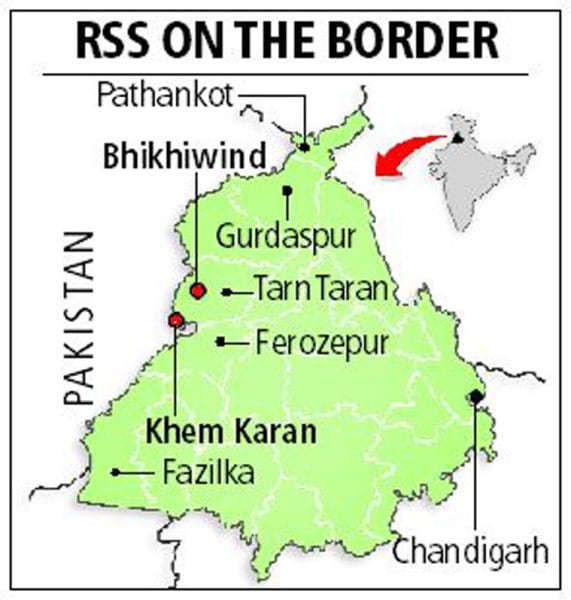- India
- International
Shakhas sprout along Punjab border belt, RSS pracharak says ‘our time has come’
BY: CHANDER SUTA DOGRA At a time when it is under attack for its ‘ghar wapsi’ campaign, the RSS is returning to the very grounds from where it was uprooted at the height of militancy in Punjab, a state where the relations of its political arm, the BJP, with ruling partner SAD is already under […]
BY: CHANDER SUTA DOGRA

At a time when it is under attack for its ‘ghar wapsi’ campaign, the RSS is returning to the very grounds from where it was uprooted at the height of militancy in Punjab, a state where the relations of its political arm, the BJP, with ruling partner SAD is already under strain.
Towns and villages along the border with Pakistan — from Bhikhiwind to Khemkaran to Pahuwind – have been waking up every morning to the sights and sounds of shakhas in parks and grounds.
In the 1980s, Sikh militants forced Hindu families to flee the countryside. Now, three decades later, the RSS and its affiliates hope to extend the Parivar footprint along the border belt.
College student Sunil Kumar, shakha in-charge at Bhikhiwind, ensures 40 boys gather every morning at a school ground. “School and college students, mostly from the weaker sections, come here. Others have begun taking interest after we organised a big function on Dussehra,” he said.
RSS affiliates have been reaching out to the rural population through a network of educational and social welfare organisations. Workers say they have also been told to prevent conversion of Dalit Sikhs to Christianity and “return to the faith” those who have already crossed over.

Last Sunday, the Dussehra ground in Tarn Taran, 25 km from the border, hosted the annual Sangh sammelan. A pracharak from Delhi told the gathering of volunteers: “The combined work of all our organisations is beginning to show results in your area. Our time has come. You must prepare yourself to be part of a national movement.”
Pamphlets about a ‘Virat Dharm Sammelan’, being organised in Tarn Taran by the Vishwa Hindu Parishad and Bajrang Dal on February 8, were distributed. Dr Karunesh Gupta, who heads the RSS Amritsar vibhag, said: “Such an event was not possible in these parts a few years ago.”
Brigadier (retired) J K Gagneja, RSS sahprant sanchalak, said there are 795 shakhas across Punjab, up from 200 a few years ago, and the focus now is on the border areas. The youth, he said, comprise 60 per cent of their workforce and are spearheading most activities.
Functioning of single-teacher schools, most run by the Ekal Abhiyan Yojana (EAY) and the Madhav Rao Muley Sewa Trust (MRMST), are being coordinated by RSS veterans. The EAY, funded mainly by NRIs, is a large network of more than 50,000 single-teacher schools across the country. In Punjab, its vidyalayas are spread across Ferozepur, Amritsar and Tarn Taran districts while the MRMST has similar schools in the border areas of Pathankot, Gurdaspur and Amritsar.
Krishan Arora, who heads the MRMST in Punjab, told The Indian Express: “These are mainly two-hour sessions after school. Teachers coach children, spread patriotic and social messages. We also run physical and mental training camps for school and college students.”
The Vidya Bharati Shiksha Sansthan and Sarvhitkari Shiksha Samiti, also RSS affiliates, run regular schools in other parts of the state.
In September, RSS Sarsanghchalak Mohan Bhagwat attended a MRMST programme in Amritsar which was attended by over 1,500 school children from its kendras in border villages.
Sangh affiliates run 1,050 single-teacher schools in the border districts. Brig Gagneja believes that as a result of these efforts, the RSS has managed to establish a presence in 50 per cent of the border districts and 25 per cent in other districts.
Mamta and her husband Narinder Dhawan, a defence contractor, are active RSS workers in Bhikhiwind. She is an MRMST teacher who is paid an honorarium of Rs 500 a month. “Our main task is to spread the message of the Sangh and prevent poor people from converting to Christianity,” Narinder said.
From Khemkaran, Bhola Singh, a Dalit youth, keeps watch on “anti-Hindu” activities in 30 villages. “Most Valmikis in the villages are being converted to Christianity, so we try to teach them the virtues of Hinduism. Some have been re-converted with our efforts.”
Apr 26: Latest News
- 01
- 02
- 03
- 04
- 05








































